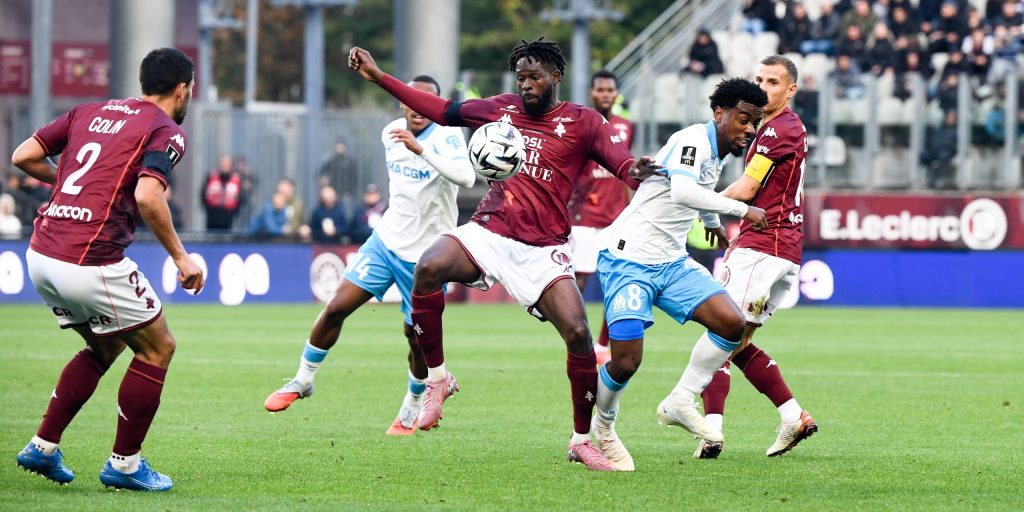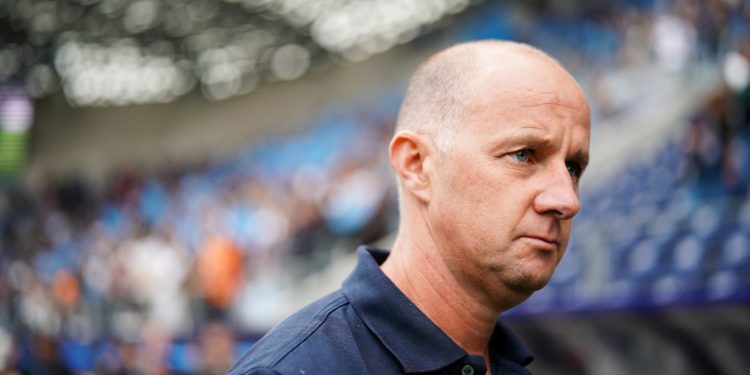When you know that your team’s goal is to avoid relegation, quickly accumulating as many points as possible becomes a matter of life and death. Metz supporters know this better than anyone. Riding the lift has almost become a habit for them.
Promoted to the top flight on six occasions (2007, 2014, 2016, 2019, 2023, 2025) over the last 20 years, the Lorraine-based club has suffered immediate relegation to Ligue 2 three times (2008, 2015, 2024). And with only two points to their name after eight Ligue 1 matches this season and bottom of the table, it’s proving difficult for Stephane Le Mignan’s men to inspire anything other than a wave of pessimism.
In a poll published on 12th October in Le Republicain Lorrain, 66% of the 1,471 voters believed that Les Grenats had ‘no chance’ of staying up at the end of the 2025-26 season.
In this case, the question of whether this is fatalism or simple realism is tricky to answer. Reality shows that it may be a bit of both.
Metz can build on history to hope for staying up
It has to be said that the history of the French championship does not really speak in their favour. In the 21st century, eight teams have found themselves in a situation similar to that of FC Metz.
Seven of them were subsequently relegated. Five — Dijon (2020-21), Arles-Avignon (2010-11), Grenoble (2009-10), Metz (2007-08) and Le Mans (2003-04) — even finished in 20th and last place in the championship. The other two, Gazelec Ajaccio (2015-16) and Troyes (2012-13), finished 19th.

The only exception, and certainly the most memorable, lies in FC Nantes’ exceptional comeback in 2001-02. The reigning French champions, the Bretons, whose start to the season had been difficult to say the least, still managed to turn things around and finish 10th in the table. This feat was all the more remarkable given that it was achieved in a league consisting of only 18 teams.
However, Nantes were not the first to achieve such an achievement. Just over 50 years earlier, just after the Second World War, FC Sete, twice winners of the French championship in the 1930s, had also managed to extricate themselves from a comparable situation, securing their place in the top flight by finishing 16th.
That fate was not to be shared by Strasbourg in the 1951-52 season, as they were never able to climb out of the bottom of the table. Half a century later, history seems to be repeating itself.
Multiple issues to be resolved
For the moment, there seems to be no indication to the contrary. Beyond their meagre results, there are also concerns about the content of FC Metz’s performances.
In Toulouse, where the Lorraine side suffered a heavy 4-0 defeat last week, club president Bernard Serin expressed his “upset” at this sixth defeat of the season. Le Mignan, for his part, made no secret of his “anger” at his team’s performance. A sentiment echoed by Jean-Philippe Gbamin, an experienced member of the dressing room, who also pointed out that his team “had no right to start a match like that after having had two weeks to prepare for it”.
It was a justified outburst from the former Mainz and Everton player, who saw his team concede two goals in the space of eight minutes before being reduced to 10 men following the sending off of his teammate Sadibou Sane for a heavy foul on Cristian Casseres. Outnumbered, Metz then conceded two more goals in the second half, their 19th and 20th after eight games, consolidating their status as Ligue 1’s most permeable defence.
A fragility that their attacking statistics cannot even help to offset, as Metz have only managed to find the back of the net five times this season, with their last goal coming on 21st September.
A delicate situation that could quickly turn untenable, both for Metz and Le Mignan. “Of course he’s under threat. That’s how football is. He’s under threat because of the results, because that’s the tree that hides the forest,” admitted Frederic Arpinon, the club’s sporting director, referring to his coach.
However, in his view, the die has not yet been cast for Le Mignan. “I can’t say that Stephane is cheating: he arrives at 7 a.m. and leaves at 9 p.m., and believe me, he doesn’t watch movies. Is it an ultimatum? Not at all.”
“We’re trying to think things through sensibly. We mustn’t repeat the mistakes of the past. Yes, Stephane needs to change certain things. I wouldn’t say he’s ‘the right man for the job’, but we’re convinced he’s the right coach for Metz.”
Against Lille on Sunday, breaking this negative spiral will not be a simple matter of coming up with a good idea to get back on track. No, it will (already) be one of survival. For everyone.





